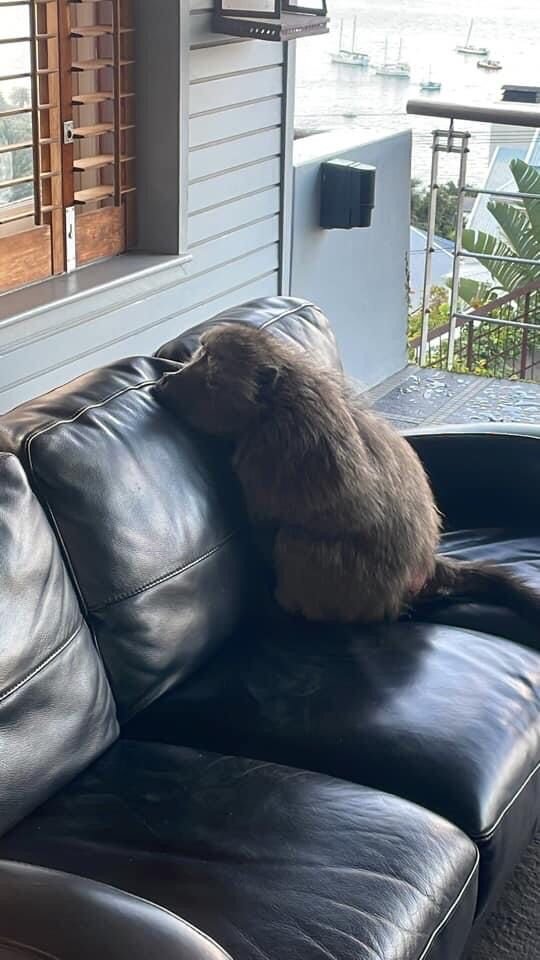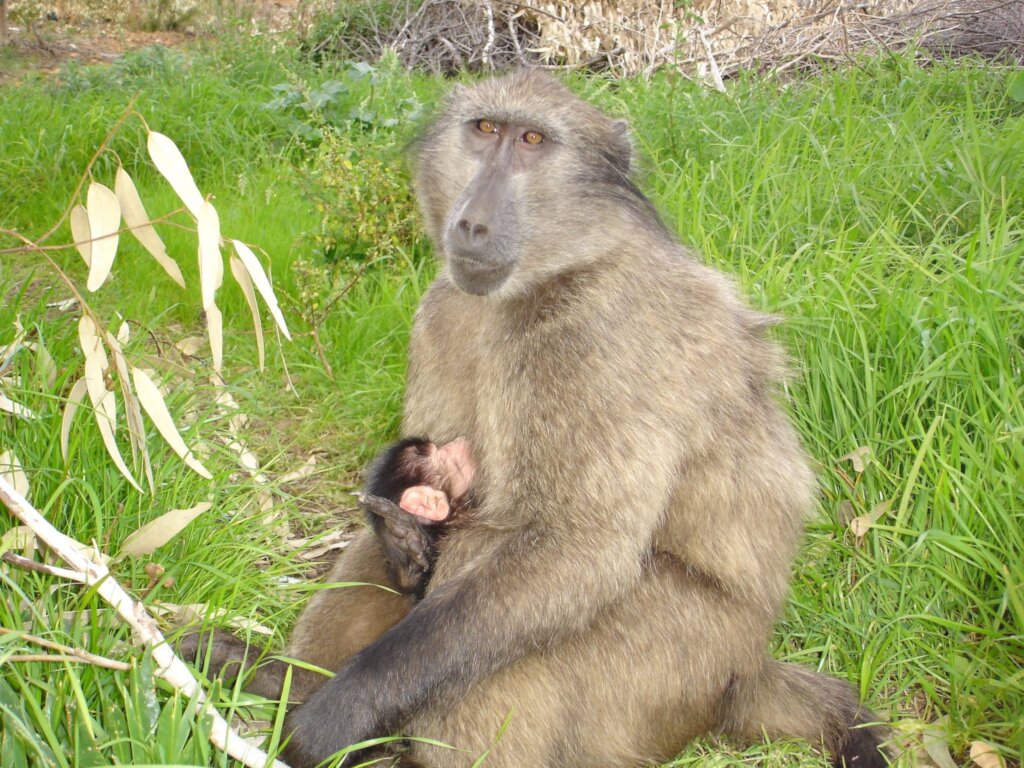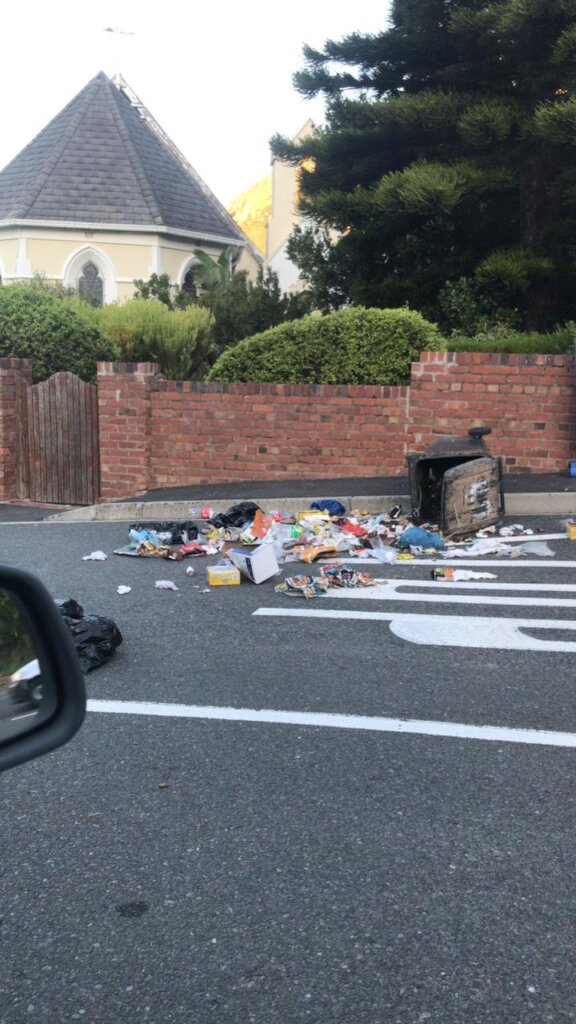By Jenni Trethowan | Founder Member
Stop killing baboons – July 2022 Report
In the past few months, we have engaged with the Minister of Environment and participated in a public meeting led by the City of Cape Town as they attempt to find solutions and improvements to the management of the baboon human interface.
The process and public participation is long overdue, but so far does not seem to hold any real solutions. Here is my post detailing the process so far:
In the early years of managing the baboon human interface, a great deal of time and energy was spent looking at different ideas, solutions and options and in all our deliberations one thing became clear, the cost of doing nothing far outweighed the cost of getting an effective management program in place.
The notion of doing nothing was further explored by a UCT economics researcher who showed conclusively that the cost of damage to property, and costs of time and effort caused by baboons coming into human occupied areas was extensive, his paper was part of the court submissions when the issue of the various role players’ mandates was put before the High Court in 2015. (CoCT asked the High Court for a Declaratory Order defining the mandates of TMNP, Cape Nature, Dept of Environment and the SA Navy and the judge found the “cooperative management to be effective” so no Declaratory Order was given – all respondents accepted his ruling)
At that stage, the focus was purely on the economic costs, but over the years it has become clear that the cost of baboons being in the urban edge is very high to the baboons themselves, as they are shot at, attacked and viciously killed by dogs, run over by cars and have key members of the troop removed (killed) for being problematic in human terms.
In addition to the cost issues, we can never overlook the ethical, cultural and historical significance of baboons; on the Cape peninsula we are privileged to enjoy status as a World Heritage Site as well as being one of only two cities in the world surrounded by a national park. So, yes, we all agree that it is healthier for baboons and saves considerable costs to people if baboons did stay within the Table Mountain National Park – the problem is the national park is an open access park within meters from many residential or business areas and after nearly 30 years of meetings, collaborations and debates a City of Cape Town-led meeting last night showed us that we are no closer to resolving key issues than we were in the late 1990’s.
City of Cape Town Deputy Mayor Eddie Andrews started the meeting by encouraging everyone not be too focused on the mandates and to rather work with new vigor towards a new sustainable management plan, thereafter (as much as we desperately wanted to) it was difficult to get any real sense of direction, purpose or outcomes from the meeting.
CoCT environmental manager Julia Woods presented on behalf of the CoCT and we were told that the Urban Baboon Project had been a success, but was not sustainable. Then, in the next breath, “it wasn’t a success anymore” because the baboons have become used to the aversion tools, are still getting access to high reward foods from waste and the admission that the CoCT could have dealt with a number of issues better.
Frustratingly many of the so-called “new plans” are the very aspects that Baboon Matters and other advocates have been calling for many years now – effective waste management, appropriate bins, by-laws, education, signage, the naval issues. It was astounding to hear these “new plans” presented as if they had just been thought of.
The key point I took from the CoCT presentation is that they are delighted to have all the partners “back at the table”, and that the partners (CoCT, TMNP, Cape Nature will form a Task Team) would all be working collaboratively towards a new sustainable project; yet as the meeting progressed too many questions reverted back to the issue of mandates, which we are assured the partners would work out amongst themselves.
My concerns about this “new” Task Team and the new way forward is that the very people who have been the architects of the urban baboon management are the same people who will be finding the “new sustainable” approach. The only “fresh thinking” in the past 12 years was the use of aversion tactics and despite the fact that many, many experts warned against going down the aversion route, the collective decision makers have focused all efforts on, for the “good of the baboons”, finding ways to chase and scare them away.
We have pointed out over and over again that aversion and landscape of fear was not working, that waste management was a key attractant, and last night the CoCT regretfully, admitted yes the bins were still unresolved and yep, they could have done things better….
The one positive of the meeting was that the notion of waste rangers was welcomed; the idea was first promoted in 2016! (My idea was then taken up in the Overstrand who adapted the concept and employed 12 rangers to deal specifically with waste management issues and have found that the project is working well.)
So a positive attitude, positive political leadership – but the same people on the Task Team, people who have shown little inclination towards review and change over the past years. It is hard to see the glass half full.
There were questions as to how the Task Team will effectively liaise with residents and stakeholders; I did not think there was a clear answer to that question and I am not sure where the “activists and advocates” fit in the inclusive process described. They were at pains to say how the community, residents and NGOs would be consulted, but the nuts and bolts were missing.
Although Baboon Matters must be one of the few NGO’s Eddie Andrews and Geordin Hill-Lewis have still not found time to meet with or talk to in preparing for the change of management strategies, I did have a chance to ask some questions at the meeting last night – the most pressing of which did not get properly answered; are there plans to “reduce baboon numbers through culling troops? Notably the Waterfall and CT2 troops?” and “would the Task Team consider a moratorium on killing baboons while they work on their mandates and sustainable new plans? Noting that Mayor Rabie called for a moratorium in the Overstrand.” I did not get an equivocal Yes, we will have moratorium and will not kill any further baboons whilst we sort things out, instead there was a wafty answer indicating that the partners (Cape Nature?) will take the lead on those decisions.
I so want to be positive about the incentive lead by Minister Creecy, and now pushed by Deputy Mayor Eddie Andrews, but I am seeing just too many ghosts of projects past continuing to haunt baboon management and too little emphasis on dealing with the human issues. I hope the Task Team and public engagement process will result in new improved systems, we are grateful for some new signage but really need focus to be on the bins and by-laws, the notion of electric fences at strategic points and the vexing issue of mandates – all of which have been on the table since 1998…
We had barely responded to the meeting when news of three adult baboons males needing to be relocated was announced, what this really means is that the males are either dispersing or have been noted as “problem causing” animals and, according to current guidelines and protocols, these baboons could be killed by the authorities.
And things for the Cape peninsula baboons seem to be getting worse! One of our dear old girls, Crookie – Mary, was viciously attacked and killed by dogs, and then this week yet another of our adult females had to be euthanased due to complications from a miscarriage; in each case the females’ bodies were found to be riddled with pellets, it is just unacceptable how persecuted these animals are.
Baboon Matters is working hard liaising with communities, resident groups and our colleagues who advocate for better management with us. We are requesting, again, that there is a moratorium put in place whilst the role players resolve the ongoing issues as described in my post above.
We are also planning to buy our first 5 Emergency Rescue Packs so that organisations and groups working with baboons, and other wildlife, are equipped to safely capture and contain injured wildlife so that they can get appropriate veterinary attention. Due to the sharp increase in prices of steel and materials needed to build our specifically designed trap cages, we need to raise approximately R72 000 (prices are subject to change – so we would like to order the material as soon as possible) to supply 5 organisations so that each group has an effective trap cage, control pole, plunge syringe and capture net.
Lots of work ahead, thank you for your wonderful support to date and I look forward to positively reporting back in coming months.
Project reports on GlobalGiving are posted directly to globalgiving.org by Project Leaders as they are completed, generally every 3-4 months. To protect the integrity of these documents, GlobalGiving does not alter them; therefore you may find some language or formatting issues.
If you donate to this project or have donated to this project, you can receive an email when this project posts a report. You can also subscribe for reports without donating.
Support this important cause by creating a personalized fundraising page.
Start a Fundraiser

